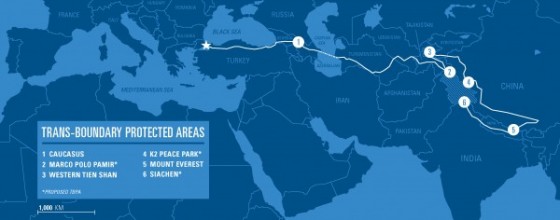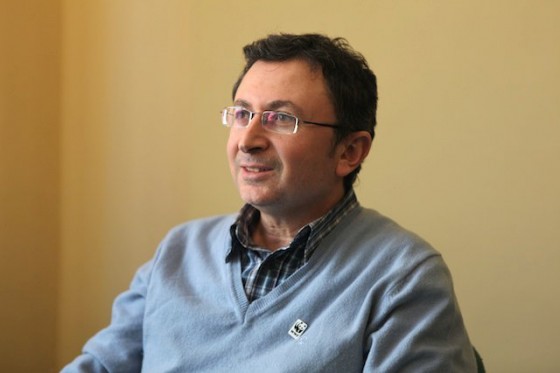 These women began their epic 10,000 mile biking for transboundary conservation journey in Istanbul.
These women began their epic 10,000 mile biking for transboundary conservation journey in Istanbul.
Following their own footsteps down an entirely different path, best friends Kate Harris and Melissa Yule left Istanbul to continue a year-long tour of transboundary protected areas (TBPAs) along the Silk Road.
With concern that these outlaying ecosystems are especially vulnerable to the effects of climate change, the women intend to record their expedition – visually and in script – to draw international attention to these legendary, beautiful but decidedly rugged areas.
This will not be the first time the pair have taken on long-distance biking, since they traveled across the States and through Xinjiang and Tibet in Western China, so they are well-equipped for their journey.
Only this time, their travels have taken on a particular significance. Rather than a simple travel documentary, Kate and Mel are interested to meet with locals, conservationists and scientists along the way to determine whether TBPAs are an effective tool for peace-building in a fractured reason.
Much like the Middle East experiences on its borders, Israel and Jordan share a polluted river, Israel and Lebanon spar over natural gas, conflicts arise over natural resources that spill across countries. As they become increasingly scarce, those conflicts are likely to escalate.
Their journey began in Instanbul, where they interviewed Dr. Sedat Kalem, director of WWF-Turkey, about transboundary conservation in the Caucasus mountains. They have since left to bike along the Black Sea coast on donated Seven Cycles and in approximately one year, 10,000 miles of rugged terrain later, they will land in India.
Other areas they will tour include what Treehugger called “the world’s highest battlefield” – the K2 Siachen Peace Park. A source of water for downstream communities, the disputed Siachen Glacier has riveted India and Pakistan for some time.
They will also visit the Pamir Mountains, where wildlife biologist George Schaller has been petitioning local governments on behalf of Marco Polo Sheep, a popular trophy for hunters in Tajikstan, Afghanistan, China, and Pakistan.
Kate wrote this in her latest Cycling Silk Blog Post:
But the Silk Road that most enchants me exists on the outskirts of itself, the spaces in between the fabled cities, where the road frays into trails leading to borderlands: mountains on the fringe of the humanly habitable; alpine desert ecosystems oblivious to the arbitrary lines that sever them on maps; the territory of nomads, snow leopards, dust storms and dreams.
Exploration for Kate and Mel has taken on a new dimension, a spiritual dimension and protective dimension. Those who travel know better what is at stake, and as these brave cyclists will go to extraordinary ends to ensure their continuity.
images via Cycling Silk Facebook Page
More news from The Silk Road:
“Khan of the White Donkey” – An Eco Retreat Along The Silk Road
Mud Structures in the Muslim World
The Ties Between Israel and China Via Silk Road






I salute the brave ladies who taking all the pains for a noble cause of transboundary conservation, protected areas in unique ecosystem supporting some of the much threatened and endangered flora and fauna. The wildlife species have their own natural habitat which is beyond the manmade geographical and political boundaries. The wildlife does not recognize these artificial manmade boundaries and do not need passports and visa to cross into the territory of other country. Unfortunately majority of us do not understand the significance of transboundary conservation. Protection and conservation effort in one country again does not work because of the mobile nature of wildlife resources. Thus it is imperative to think, plan and work together for the common cause of conservation of our unique and endangered wildlife species like marcopolo sheep, snow leopard, urial, markhor, ibex and associated flora and fauna.
The 10,000 mile long journey of the two great women on bike through rough, rugged mountain terrains gives a clear message to the custodian nations and of course to the donor communities to look into the matter of transboundary conservation to protect and conserve the unique ecosystem in general and the precious endangered wildlife resources in particular for the future generation and for humanity.
I am optimistic that this historical expedition covering Caucasus, Marco Polo Pamir, Western Tien Shan, K2 Peace Park, Mount Everest and Siachin will create more awareness among nations and serious thinking and planning for creating Transboundary protected areas, conservancies and national park will be undertaken by the concerned nations.
Aziz Ali,
Badakhshan,
Afghanistan
Thank you Aziz. I will pass on your comments to them; I’m sure they will be happy to know that the good people of Afghanistan support their work.